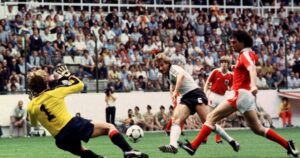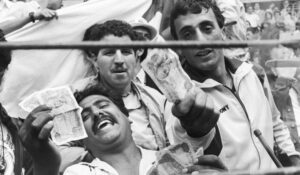Match Details
All started on June 25, 1982 when the final group stage match of the 1982 FIFA World Cup was played between West Germany and Austria in Gijón, Spain. This match would come to be known as the “Disgrace of Gijón,” as it was marred by allegations of match fixing and collusion.

Going into the match, both teams knew that a West Germany just 1-0 win would secure for both teams their place in the second phase of the tournament. At that time two points were awarded for a win and one for a draw. Thus, before the last third round in the group, Austria leads with 4 points, Germany and Algeria have 2 each, Chile is in the queue.

Neither Germany nor Austria are confident of their superiority. At the previous World Cup in 1978, Austrians beat Germany 3:2 but in the 1982 World Cup qualifiers, both countries were in the same group and the Germans won both matches.
“Die Mannschaft” have stars such as Rummenigge, Paul Breitner, Pierre Litbarsky and Manfred Kalz. But Austria is not far behind them either with Hans Krankl, Herbert Prohazka, Bruno Petzei and the goalkeeper Friedrich Concilia, all world-class players. God only knows what could happen if the Gijon match is played with the usual charge.
Controversy
However, as the match kicked off, it quickly became apparent that something was amiss. The two teams were playing at a slow pace, with few chances being created by either side. In the 10th minute, disaster struck, Horst Hrubesch scored for West Germany, giving them a 1-0 lead. The Austrian team seemed to deflate after the goal, and the match continued at a slow pace.
From here until the end of the match, both teams kick the ball in a friendly atmosphere, mostly in the center of the field. Only Reinhold Hintermaier and Walter Schachner try a little harder than the rest, and the latter even receives a yellow card.
As the match wore on, the allegations of collusion began to surface. Rumores that the two teams had met prior to the match to discuss the outcome became true.
The referee that day, Scotland’s Bob Valentine, later recalled:
We were about 20 minutes in before I started getting a bad feeling. I started thinking, ‘There’s not much tackling taking place here, you know.’ Then one guy got over the halfway line, stopped with the ball and sent it all the way back to his goalkeeper. Instead of putting it into the opposition box, he played it backwards. That was the moment when I realised something was wrong.
The apparent downing of tools was so blatant that fans in the crowd booed, whistled and waving bank notes. What’s more, the proud German audience also booed theirs. One of them even sets fire to the national flag in an attempt to protest the disgrace!

The final score of the match was 1-0 in favor of West Germany which meant that that both teams progressed to the next round of the tournament, as Algeria could not catch up in terms of points.
Result
The whole world is outraged by the apparent arrangement. All the world’s media are speaking in the same spirit. The commentator of the German state television ARD, Eberhard Sanek, stated: “The game was shameful, the end does not always justify the means. “Bild” comes out with the headline: “Shame on you!”, and “Kicker” adds: “There was no football in Gijon.”
Even more extreme is the announcer of the Austrian ORF television, Robert Seeger. He directly calls on the air the entire nation to turn off their televisions so as not to watch the shame, and for the last half hour he has not uttered a single word.
At this time, the unfortunate participants in the match wonder what to explain. German coach Jupp Dervall insists that the ranking is the most important, not the means by which it was achieved. However, there is no one to hear that – more than 5,000 German fans gather in protest in front of the hotel where the football players are staying. No one believes the famous Austrian striker Krankl, who developed the version that he and his teammates did not want to get tired.
Finally, the Algerians telexed to FIFA that Austria and Germany should be kicked out of the World Cup. However, Zurich officials coolly responded: “Both teams had the right to play for the sake of their security.” The FIFA president at the time, João Havelange, refused to take action, stating that there was not enough evidence to prove that the match had been fixed.
Despite the controversy, both West Germany and Austria were allowed to progress to the next round of the tournament. West Germany reached the final where they had to face Italy. The final, played on July 11, 1982, ended in a 3-1 victory for Italy, giving them their third World Cup title.
Conclusion
Following this match FIFA subsequently changed the group system for future tournaments so the final two games in each group to be played simultaneously. This revision made it highly difficult, if not impossible, for teams to engage in match-fixing.
The “Disgrace of Gijón” remains one of the most controversial moments in the history of the FIFA World Cup, and serves as a reminder of the importance of fair play in the beautiful game. It is a dark stain on the history of the tournament, one that will never be forgotten.